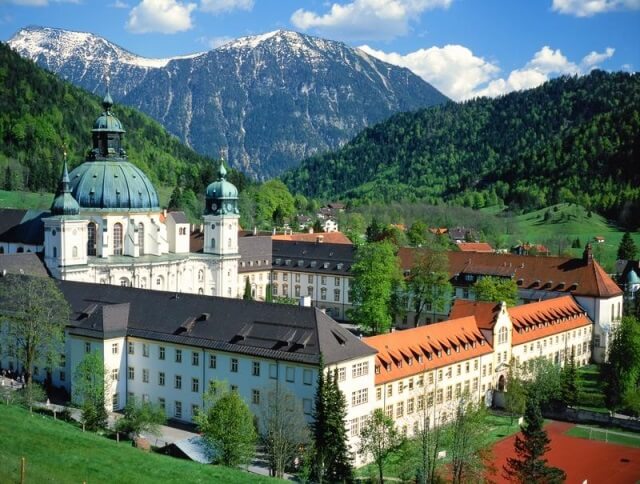Last time we visited the lavish halls and homes tied to King Ludwig II and his royal family. Today we will explore another type of dwelling commonly found in the Bavarian Alps.
Although belonging to another sector of the region’s historical population, the noteworthy structures are no less sophisticated. “A surprising feature of the Bavarian Alps is the large number of monasteries and abbeys that are to be seen here,” says the DK Eyewitness Travel Guide: Munich and the Bavarian Alps.
The DK Guide describes that the first monasteries to be established in the Bavarian Alps was during the early middle ages. Other flourishing periods for the construction of monastic buildings were during the 11th and 12th centuries and during the Enlightenment period. Although more than 160 monasteries were secularized at the beginning of the 19th century, today visitors can still visit numerous of these beautifully grand edifices and grounds and even in some cases observe present day monastic culture. Whether or not you prescribe to the same faith symbolic of the abbeys located throughout the Bavarian Alps’ foothills, your senses will be smitten as will your cultural curiosity.
Ettal Abbey is an example of a Benedictine monastery that is currently home to a community of practicing monks. Founded in 1330, today the abbey’s castle-like structure and dome-topped cathedral is open to the public for tours and services. Since its monastic community of 50 abides by the Benedictine principles of being self-sufficient, visitors can also tour the fruits of the monks’ labours, such as their cheese factory, brewery, farm, gardens and market.
Ottobeuren Abbey, located in the Bavarian Allgäu, was founded in 764 by its first abbot, Toto. Today it has priory status and a population of just over 20 monks. Four times a day the monastic community engages in prayerful songs and chants. Visitors can tour around the abbey’s art gallery with works ranging from the Gothic to the Baroque period, the library of leather bound books, marble columns and elaborate murals and the ornate Emperor’s hall. Ottobeuren Abbey also offers retreats and workshops to individuals seeking reflection, spiritual enlightenment or positive mental health.
In addition, the Bavarian region is home to other religious grandeur, including the Frauenchiemsee Monastery, the Monastery of St. Mang, the Benedictine Abbey of Niederalteich and more. Whether you visit one or more of these holy sites or find your own secluded patch of nature or architecture, you will undoubtedly experience your own personal sense of spirituality throughout the Bavarian Alps.

